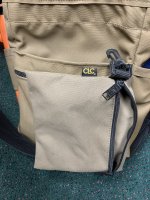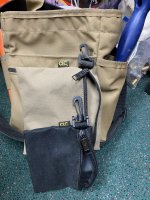Find's Treasure Forums
Welcome to Find's Treasure Forums, Guests!
You are viewing this forums as a guest which limits you to read only status.
Only registered members may post stories, questions, classifieds, reply to other posts, contact other members using built in messaging and use many other features found on these forums.
Why not register and join us today? It's free! (We don't share your email addresses with anyone.) We keep email addresses of our users to protect them and others from bad people posting things they shouldn't.
Click here to register!
Need Support Help?
Cannot log in?, click here to have new password emailed to you
You are using an out of date browser. It may not display this or other websites correctly.
You should upgrade or use an alternative browser.
You should upgrade or use an alternative browser.
Clean Finds ?
- Thread starter moose57
- Start date
bootyhoundpa
Well-known member
Cleaning is something people do at home… personally I don’t do anything other than a gentle rubbing the dirt off in the field..if I notice it has value I will leave the dirt on it till I get home.. many take water and use it to flush the loose dirt off then put it in something to protect it from scratches..
I'm no expert...and I wouldn't touch anything that might be valuable, but here is what I've found works for me.
I put most things in a plastic pill container with some moist grass, leaves or dirt to keep from drying out. When I get home I run most items under water (without any brushing) to get the dirt off. Then I let dry. When dry, I see if I have to pick at coins with a toothpick or leave alone. Most get left alone. I rarely use a toothbrush on coins. After a few days drying, some coins are then buffed with Ren Wax, but again most aren't.
For large iron, I will use a toothbrush and water to scrub the dirt off. After some days, when absolutely dry, large iron can be cooked just like you're cooking snappers. Oil in the pan, get them hot. Don't over-cook and burn the oil as you'll smell out your house. The iron gets its original black hue back and won't rust any further. Good luck to you.
I put most things in a plastic pill container with some moist grass, leaves or dirt to keep from drying out. When I get home I run most items under water (without any brushing) to get the dirt off. Then I let dry. When dry, I see if I have to pick at coins with a toothpick or leave alone. Most get left alone. I rarely use a toothbrush on coins. After a few days drying, some coins are then buffed with Ren Wax, but again most aren't.
For large iron, I will use a toothbrush and water to scrub the dirt off. After some days, when absolutely dry, large iron can be cooked just like you're cooking snappers. Oil in the pan, get them hot. Don't over-cook and burn the oil as you'll smell out your house. The iron gets its original black hue back and won't rust any further. Good luck to you.
For me, cleaning of older coin types began in the field. Silver coin finds get a quick date look and then dropped into a pill bottle filled with water. All cents get glanced at to determine if they deserve going into a water filled pill bottle. If an I H or wheat cent, it goes into a bottle. I spend very little time out in the field trying to determine what dates and mint marks are. This is all done at home after the hunt is done with good light and magnifying glass. Coins soaking in water filled pill bottles during hunting time clean up easier when at home. HH jim tn
Ronstar
Well-known member
Im curious here, and I’m looking at this slightly different (as a cop)….. we are taught not to ever seal anything up in the field for evidence recovery in a plastic bag or container, especially if damp or wet. Plastic doesnt breath and other chemical reactions can occur with the item. Virtually everything goes into paper bags/packets and allowed to dry naturally. Now, never thought about it this way but wouldnt oxidation or other reactions in a sealed plastic object occur? Maybe not in a container with water, but wouldnt copper still be subject to sweating and discoloring?
I carry small a spray bottle with water for quick clean on silver and both my coin pouches are cordura nylon so breathable.
I carry small a spray bottle with water for quick clean on silver and both my coin pouches are cordura nylon so breathable.
I've been doing the small bottle with water thing for probably four decades and never had a I H or wheat back oxidise. Once I get the date and coin rinsed off, I promptly blot it dry with a soft cloth. The whole purpose putting coins in the water is to aid in softening the crud so one doesn't have to do heavy, abrasive cleaning and gives slight protection. My hunting buddy who passed on to the big park in the sky used to put a dollop of soap in his water bottle. Anyway, it works for me as seldom am I unable to get a date off of a wheat or I H cent. HH jim tn
nwdetectorist
Active member
100% agree. I carry pill bottles and/or other similar container with slightly dampened sponges to place a ring in, then a sponge in between it and the next ring etc. I do the same with coins. If I find something I am certain has real value, I have learned to leave the dirt in place and wrap in dry paper towel or tear off a bit of the small rag I usually carry. Silver (even coin alloyed silver) and Gold are to easily scratched to be messed with in the field. IMHOCleaning is something people do at home… personally I don’t do anything other than a gentle rubbing the dirt off in the field..if I notice it has value I will leave the dirt on it till I get home.. many take water and use it to flush the loose dirt off then put it in something to protect it from scratches..
BigTony
Well-known member
Ron, what brand names for a Codura Nylon pouch?Im curious here, and I’m looking at this slightly different (as a cop)….. we are taught not to ever seal anything up in the field for evidence recovery in a plastic bag or container, especially if damp or wet. Plastic doesnt breath and other chemical reactions can occur with the item. Virtually everything goes into paper bags/packets and allowed to dry naturally. Now, never thought about it this way but wouldnt oxidation or other reactions in a sealed plastic object occur? Maybe not in a container with water, but wouldnt copper still be subject to sweating and discoloring?
I carry small a spray bottle with water for quick clean on silver and both my coin pouches are cordura nylon so breathable.
Tony
Ronstar
Well-known member
Tony, just threw the plastic bag away about two weeks ago. I went to the local ACE Hardware store and saw a semi inexpensive package of three zipper top pouches. Mid size fits perfect in the finds pouch front pocket so items of interest go in there, the smallest pouch also fits in the big pocket and my coins go in that. Largest pouch of the three is in my hunting pack. I cannot remember the brand name but it was in the section of the store with the work wear accessories.
Last edited:
Ronstar
Well-known member
A couple pics for ya. The tan fits perfect inside the front pouch of the finds bag, smaller black one fits in front of the brown. Note the clip which come in handy if you need to carry outside the finds pouch.




